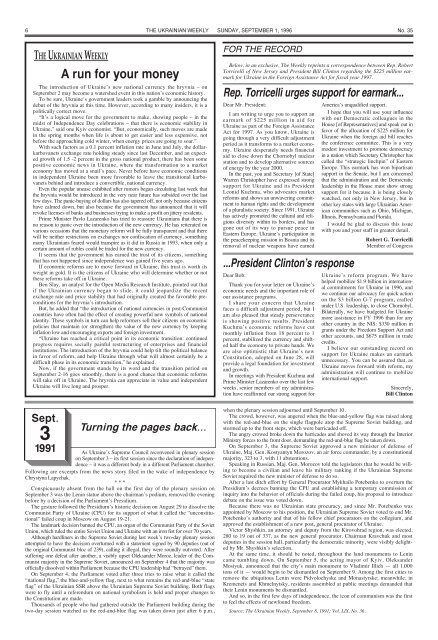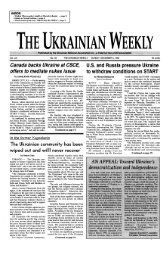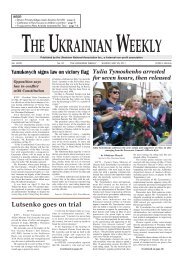Published by the Ukrainian National Association Inc
Published by the Ukrainian National Association Inc
Published by the Ukrainian National Association Inc
You also want an ePaper? Increase the reach of your titles
YUMPU automatically turns print PDFs into web optimized ePapers that Google loves.
6 THE UKRAINIAN WEEKLY SUNDAY, SEPTEMBER 1, 1996<br />
No. 35<br />
THE UKRAINIAN WEEKLY<br />
A run for your money<br />
The introduction of Ukraine’s new national currency <strong>the</strong> hryvnia – on<br />
September 2 may become a watershed event in this nation’s economic history.<br />
To be sure, Ukraine’s government leaders took a gamble <strong>by</strong> announcing <strong>the</strong><br />
debut of <strong>the</strong> hryvnia at this time. However, according to many insiders, it is a<br />
politically correct move.<br />
“It’s a logical move for <strong>the</strong> government to make, showing people – in <strong>the</strong><br />
midst of Independence Day celebrations – that <strong>the</strong>re is economic stability in<br />
Ukraine,” said one Kyiv economist. “But, economically, such moves are made<br />
in <strong>the</strong> spring months when life is about to get easier and less expensive, not<br />
before <strong>the</strong> approaching cold winter, when energy prices are going to soar.”<br />
With such factors as a 0.1 percent inflation rate in June and July, <strong>the</strong> dollarkarbovanets<br />
exchange rate holding steady since last December, and an expected<br />
growth of 1.5 -2 percent in <strong>the</strong> gross national product, <strong>the</strong>re has been some<br />
positive economic news in Ukraine, where <strong>the</strong> transformation to a market<br />
economy has moved at a snail’s pace. Never before have economic conditions<br />
in independent Ukraine been more favorable to leave <strong>the</strong> transitional karbovanets<br />
behind and introduce a convertible, national currency.<br />
Even <strong>the</strong> popular unease exhibited after rumors began circulating last week that<br />
<strong>the</strong> hryvnia would be introduced in <strong>the</strong> very near future has subsided over <strong>the</strong> last<br />
few days. The panic-buying of dollars has also tapered off, not only because citizens<br />
have calmed down, but also because <strong>the</strong> government has announced that it will<br />
revoke licenses of banks and businesses trying to make a profit on jittery residents.<br />
Prime Minister Pavlo Lazarenko has tried to reassure <strong>Ukrainian</strong>s that <strong>the</strong>re is<br />
no reason to panic over <strong>the</strong> introduction of <strong>the</strong> new currency. He has reiterated on<br />
various occasions that <strong>the</strong> monetary reform will be fully transparent and that <strong>the</strong>re<br />
will be nei<strong>the</strong>r restrictions on exchanges nor confiscation of currency, something<br />
many <strong>Ukrainian</strong>s feared would transpire as it did in Russia in 1993, when only a<br />
certain amount of rubles could be traded for <strong>the</strong> new currency.<br />
It seems that <strong>the</strong> government has earned <strong>the</strong> trust of its citizens, something<br />
that has not happened since independence was gained five years ago.<br />
If economic reforms are to move forward in Ukraine, this trust is worth its<br />
weight in gold. It is <strong>the</strong> citizens of Ukraine who will determine whe<strong>the</strong>r or not<br />
<strong>the</strong>se reforms take off in Ukraine.<br />
Ben Slay, an analyst for <strong>the</strong> Open Media Research Institute, pointed out that<br />
if <strong>the</strong> <strong>Ukrainian</strong> currency began to slide, it could jeopardize <strong>the</strong> recent<br />
exchange rate and price stability that had originally created <strong>the</strong> favorable preconditions<br />
for <strong>the</strong> hryvnia’s introduction.<br />
But, he added that “<strong>the</strong> introduction of national currencies in post-Communist<br />
countries have often had <strong>the</strong> effect of creating powerful new symbols of national<br />
identity. These symbols in turn can help reformers sell <strong>the</strong>ir citizens on economic<br />
policies that maintain (or streng<strong>the</strong>n) <strong>the</strong> value of <strong>the</strong> new currency <strong>by</strong> keeping<br />
inflation low and encouraging exports and foreign investment.<br />
“Ukraine has reached a critical point in its economic transition: continued<br />
progress requires socially painful restructuring of enterprises and financial<br />
institutions. The introduction of <strong>the</strong> hryvnia could help tilt <strong>the</strong> political balance<br />
in favor of reform, and help Ukraine through what will almost certainly be a<br />
difficult phase in its economic transition,” he explained.<br />
Now, if <strong>the</strong> government stands <strong>by</strong> its word and <strong>the</strong> transition period on<br />
September 2-16 goes smoothly, <strong>the</strong>re is a good chance that economic reforms<br />
will take off in Ukraine. The hryvnia can appreciate in value and independent<br />
Ukraine will live long and prosper.<br />
FOR THE RECORD<br />
Below, in an exclusive, The Weekly reprints a correspondence between Rep. Robert<br />
Torricelli of New Jersey and President Bill Clinton regarding <strong>the</strong> $225 million earmark<br />
for Ukraine in <strong>the</strong> Foreign Assistance Act for fiscal year 1997.<br />
Rep. Torricelli urges support for earmark...<br />
Dear Mr. President:<br />
I am writing to urge you to support an<br />
earmark of $225 million in aid for<br />
Ukraine as part of <strong>the</strong> Foreign Assistance<br />
Act for 1997. As you know, Ukraine is<br />
going through a very difficult adjustment<br />
period as it transforms to a market economy.<br />
Ukraine desperately needs financial<br />
aid to close down <strong>the</strong> Chorno<strong>by</strong>l nuclear<br />
station and to develop alternative sources<br />
of energy <strong>by</strong> <strong>the</strong> year 2000.<br />
In <strong>the</strong> past, you and Secretary [of State]<br />
Warren Christopher have expressed strong<br />
support for Ukraine and its President<br />
Leonid Kuchma, who advocates market<br />
reforms and shows an unwavering commitment<br />
to human rights and <strong>the</strong> development<br />
of a pluralistic society. Since 1991, Ukraine<br />
has actively promoted <strong>the</strong> cultural and religious<br />
diversity within its borders, and has<br />
gone out of its way to pursue peace in<br />
Eastern Europe. Ukraine’s participation in<br />
<strong>the</strong> peacekeeping mission in Bosnia and its<br />
removal of nuclear weapons have earned<br />
...President Clinton’s response<br />
Dear Bob:<br />
Thank you for your letter on Ukraine’s<br />
economic needs and <strong>the</strong> important role of<br />
our assistance programs.<br />
I share your concern that Ukraine<br />
faces a difficult adjustment period, but I<br />
am also pleased that steady perseverance<br />
is showing positive results. President<br />
Kuchma’s economic reforms have cut<br />
monthly inflation from 18 percent to 1<br />
percent, stabilized <strong>the</strong> currency and shifted<br />
half <strong>the</strong> economy to private hands. We<br />
are also optimistic that Ukraine’s new<br />
Constitution, adopted on June 28, will<br />
provide a legal foundation for investment<br />
and growth.<br />
In meetings with President Kuchma and<br />
Prime Minister Lazarenko over <strong>the</strong> last few<br />
weeks, senior members of my administration<br />
have reaffirmed our strong support for<br />
America’s unqualified support.<br />
I hope that you will use your influence<br />
with our Democratic colleagues in <strong>the</strong><br />
House [of Representatives] and speak out in<br />
favor of <strong>the</strong> allocation of $225 million for<br />
Ukraine when <strong>the</strong> foreign aid bill reaches<br />
<strong>the</strong> conference committee. This is a very<br />
modest investment to promote democracy<br />
in a nation which Secretary Christopher has<br />
called <strong>the</strong> “strategic linchpin” of Eastern<br />
Europe. This earmark has won bipartisan<br />
support in <strong>the</strong> Senate, but I am concerned<br />
that <strong>the</strong> administration and <strong>the</strong> Democratic<br />
leadership in <strong>the</strong> House must show strong<br />
support for it because it is being closely<br />
watched, not only in New Jersey, but in<br />
o<strong>the</strong>r key states with large <strong>Ukrainian</strong> American<br />
communities such as Ohio, Michigan,<br />
Illinois, Pennsylvania and Florida.<br />
I would be glad to discuss this issue<br />
with you and your staff in greater detail.<br />
Robert G. Torricelli<br />
Member of Congress<br />
Ukraine’s reform program. We have<br />
helped mobilize $1.9 billion in international<br />
commitments for Ukraine in 1996, and<br />
we continue our advocacy for quick action<br />
on <strong>the</strong> $3 billion G-7 program, crafted<br />
under U.S. leadership, to close Chorno<strong>by</strong>l.<br />
Bilaterally, we have budgeted for Ukraine<br />
more assistance in FY 1996 than for any<br />
o<strong>the</strong>r country in <strong>the</strong> NIS: $330 million in<br />
grants under <strong>the</strong> Freedom Support Act and<br />
o<strong>the</strong>r accounts, and $675 million in trade<br />
credits.<br />
I believe our outstanding record on<br />
support for Ukraine makes an earmark<br />
unnecessary. You can be assured that, as<br />
Ukraine moves forward with reform, my<br />
administration will continue to mobilize<br />
international support.<br />
Sincerely,<br />
Bill Clinton<br />
Sept.<br />
3<br />
Turning <strong>the</strong> pages back...<br />
1991<br />
As Ukraine’s Supreme Council reconvened in plenary session<br />
on September 3 – its first session since <strong>the</strong> declaration of independence<br />
– it was a different body in a different Parliament chamber.<br />
Following are excerpts from <strong>the</strong> news story filed in <strong>the</strong> wake of independence <strong>by</strong><br />
Chrystyna Lapychak.<br />
* * *<br />
Conspicuously absent from <strong>the</strong> hall on <strong>the</strong> first day of <strong>the</strong> plenary session on<br />
September 3 was <strong>the</strong> Lenin statue above <strong>the</strong> chairman’s podium, removed <strong>the</strong> evening<br />
before <strong>by</strong> a decision of <strong>the</strong> Parliament’s Presidium.<br />
The gesture followed <strong>the</strong> Presidium’s historic decision on August 29 to dissolve <strong>the</strong><br />
Communist Party of Ukraine (CPU) for its support of what it called <strong>the</strong> “unconstitutional”<br />
failed coup in Moscow on August 19-21.<br />
The landmark decision banned <strong>the</strong> CPU, an organ of <strong>the</strong> Communist Party of <strong>the</strong> Soviet<br />
Union, which ruled <strong>the</strong> entire Soviet Union and Ukraine with an iron fist for over 70 years.<br />
Although hardliners in <strong>the</strong> Supreme Soviet during last week’s two-day plenary session<br />
attempted to have <strong>the</strong> decision overturned with a statement signed <strong>by</strong> 90 deputies (out of<br />
<strong>the</strong> original Communist bloc of 239), calling it illegal, <strong>the</strong>y were soundly outvoted. After<br />
suffering one defeat after ano<strong>the</strong>r, a visibly upset Oleksander Moroz, leader of <strong>the</strong> Communist<br />
majority in <strong>the</strong> Supreme Soviet, announced on September 4 that <strong>the</strong> majority was<br />
officially dissolved within Parliament because <strong>the</strong> CPU leadership had “betrayed” <strong>the</strong>m.<br />
On September 4, <strong>the</strong> Parliament voted after three tries to raise what it called <strong>the</strong><br />
“national flag,” <strong>the</strong> blue-and-yellow flag, next to what remains <strong>the</strong> red-and-blue “state<br />
flag” of <strong>the</strong> <strong>Ukrainian</strong> SSR above <strong>the</strong> <strong>Ukrainian</strong> Supreme Soviet building. Both flags<br />
were to fly until a referendum on national symbolism is held and proper changes to<br />
<strong>the</strong> Constitution are made.<br />
Thousands of people who had ga<strong>the</strong>red outside <strong>the</strong> Parliament building during <strong>the</strong><br />
two-day session watched as <strong>the</strong> red-and-blue flag was taken down just after 6 p.m.,<br />
when <strong>the</strong> plenary session adjourned until September 10.<br />
The crowd, however, was angered when <strong>the</strong> blue-and-yellow flag was raised along<br />
with <strong>the</strong> red-and-blue on <strong>the</strong> single flagpole atop <strong>the</strong> Supreme Soviet building, and<br />
stormed up to <strong>the</strong> front steps, which were barricaded off.<br />
The angry crowed broke down <strong>the</strong> barricades and shoved its way through <strong>the</strong> Interior<br />
Ministry forces to <strong>the</strong> front door, demanding <strong>the</strong> red-and-blue flag be taken down.<br />
On September 3, <strong>the</strong> Supreme Soviet approved a new minister of defense of<br />
Ukraine, Maj. Gen. Kostyantyn Morozov, an air force commander, <strong>by</strong> a constitutional<br />
majority, 323 to 3, with 11 abstentions.<br />
Speaking in Russian, Maj. Gen. Morozov told <strong>the</strong> legislators that he would be willing<br />
to become a civilian and leave his military ranking if <strong>the</strong> <strong>Ukrainian</strong> Supreme<br />
Soviet required <strong>the</strong> new minister of defense to do so.<br />
After a last ditch effort <strong>by</strong> General Procurator Mykhailo Potebenko to overturn <strong>the</strong><br />
Presidium’s decrees banning <strong>the</strong> CPU and establishing a temporary commission of<br />
inquiry into <strong>the</strong> behavior of officials during <strong>the</strong> failed coup, his proposal to introduce<br />
debate on <strong>the</strong> issue was voted down.<br />
Because <strong>the</strong>re was no <strong>Ukrainian</strong> state procuracy, and since Mr. Potebenko was<br />
appointed <strong>by</strong> Moscow to his position, <strong>the</strong> <strong>Ukrainian</strong> Supreme Soviet voted to end Mr.<br />
Potebenko’s authority and that of his fellow chief procurators on <strong>the</strong> collegium, and<br />
approved <strong>the</strong> establishment of a new post, general procurator of Ukraine.<br />
Victor Shyshkin, an attorney and deputy from <strong>the</strong> Kirovohrad region, was elected,<br />
280 to 19 out of 337, as <strong>the</strong> new general procurator. Chairman Kravchuk and most<br />
deputies in <strong>the</strong> session hall, particularly <strong>the</strong> democratic minority, were visibly delighted<br />
<strong>by</strong> Mr. Shyshkin’s selection.<br />
At <strong>the</strong> same time, it should be noted, throughout <strong>the</strong> land monuments to Lenin<br />
came tumbling down. On September 5, <strong>the</strong> acting mayor of Kyiv, Oleksander<br />
Mosiyuk, announced that <strong>the</strong> city’s main monument to Vladimir Illich — all 1,000<br />
tons of it — would begin to be dismantled on September 9. Among <strong>the</strong> first cities to<br />
remove <strong>the</strong> ubiquitous Lenin were Pidvolochyske and Monastyrske; meanwhile, in<br />
Kremenets and Khmelnytsky, residents assembled at public meetings demanded that<br />
<strong>the</strong>ir Lenin monuments be dismantled.<br />
And so, in <strong>the</strong> first few days of independence, <strong>the</strong> icon of communism was <strong>the</strong> first<br />
to feel <strong>the</strong> effects of newfound freedom.<br />
Source: The <strong>Ukrainian</strong> Weekly, September 8, 1991; Vol. LIX, No. 36.

















